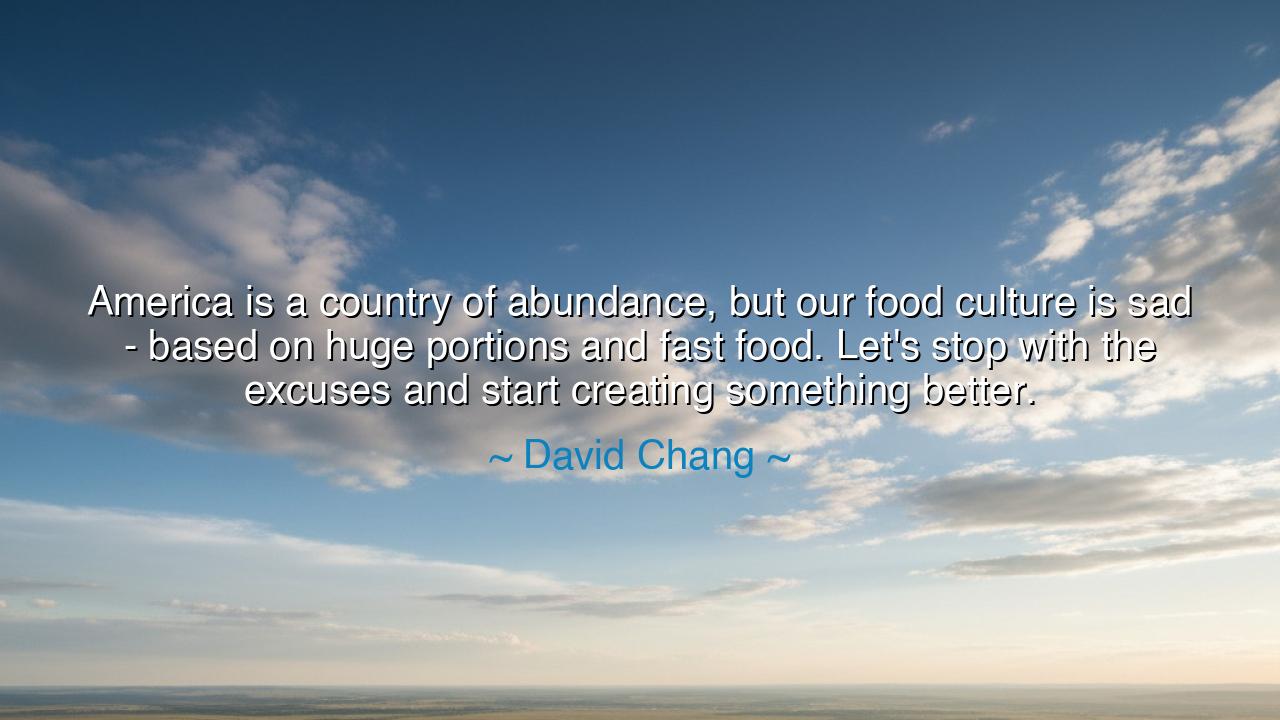
America is a country of abundance, but our food culture is sad -
America is a country of abundance, but our food culture is sad - based on huge portions and fast food. Let's stop with the excuses and start creating something better.






Hear now the voice of David Chang, a prophet of the kitchen, who declared: “America is a country of abundance, but our food culture is sad—based on huge portions and fast food. Let’s stop with the excuses and start creating something better.” In these words, sharp and unflinching, lies a truth that strikes at the heart of a prosperous but troubled land. For what use is abundance if it leads to waste? What meaning has wealth if it breeds sickness instead of strength? The table, once sacred, has become corrupted, and it is the duty of every generation to restore it to its rightful place.
In ancient times, the meal was not a thing rushed or swallowed in haste, but a rite of community and gratitude. The Greeks gathered for the symposium, where bread and wine were shared not only to fill the belly but to fill the spirit with discourse, poetry, and song. The Romans built their lives around the table, honoring gods and ancestors before each meal. Food was more than fuel; it was the bond of family, the foundation of friendship, the mark of civilization. Chang reminds us that when a nation forgets this, when it trades reverence for convenience, its spirit begins to wither even in the midst of plenty.
Consider the fate of the great empire of Babylon. Rich in harvest, blessed with rivers, it fell not for lack of grain but for excess and indulgence. Its rulers feasted without restraint while its people became complacent, dulled by luxury and forgetful of discipline. History whispers the same warning that Chang proclaims: abundance is not salvation unless it is guided by wisdom. A culture of food that exalts speed, excess, and indulgence is not culture but decline.
Yet within this lament there is also a call to heroism. Chang does not end with despair but with a command: “Let’s stop with the excuses and start creating something better.” This is the language of renewal, of rising from slumber. For excuses are the chains that bind a people to mediocrity. To shrug and say “This is the way things are” is to forfeit the power of change. But to awaken, to choose smaller portions prepared with care, to gather with family at a table instead of scattering to corners with boxes of fast food—this is already the beginning of a revolution.
We must remember also the story of the slow food movement, born in Italy when McDonald’s sought to open near the Spanish Steps in Rome. The people resisted not with violence, but with a cry for tradition: meals that honored the land, the farmer, the family, and the slowness of true enjoyment. From this protest was born a global movement, reminding nations that speed is not always progress, and that to savor is greater than to devour. This is the spirit Chang invokes: the courage to protect the sacredness of what nourishes us.
Thus, let every home become once more a temple of food. Let the farmer’s market replace the neon sign, the handmade bread replace the tasteless loaf of industry, the shared meal replace the lonely snack. This is no small act—it is the rebirth of culture itself. For when we eat well, we live well; when we honor the table, we honor life.
The lesson is clear: abundance without wisdom becomes emptiness. Do not let convenience rob you of health, of tradition, of the joy of creating together. Begin with small steps: cook one meal this week with your family, choose food that is alive with color and grown with care, bless it with gratitude, and eat it slowly. In these small acts, a culture is rebuilt. And if enough hearts heed this call, then America, and indeed all nations, may transform their abundance into a feast not only of the body, but of the spirit.






AAdministratorAdministrator
Welcome, honored guests. Please leave a comment, we will respond soon